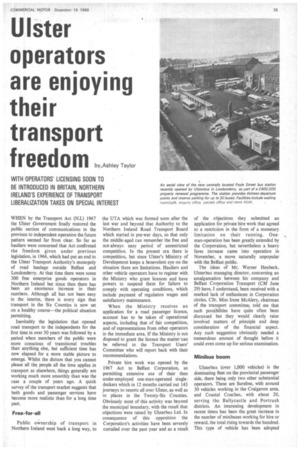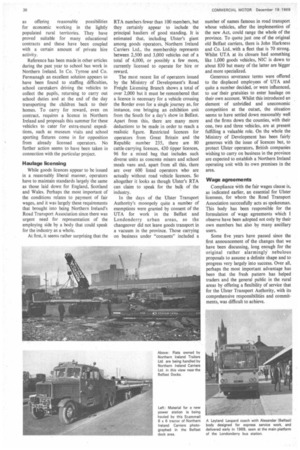Ulster operators are enjoying their transport freedom by,sheymy.
Page 37

Page 38

If you've noticed an error in this article please click here to report it so we can fix it.
WITH OPERATORS' LICENSING SOON TO BE INTRODUCED IN BRITAIN, NORTHERN IRELAND'S EXPERIENCE OF TRANSPORT LIBERALIZATION TAKES ON SPECIAL INTEREST
WHEN by the Transport Act (N.I.) 1967 the Ulster Government finally restored the public section of communications in the province to independent operation the future pattern seemed far from clear. So far as hauliers were concerned that Act confirmed the freedom given under previous legislation, in 1966, which had put an end to the Ulster Transport Authority's monopoly of road haulage outside Belfast and Londonderry. At that time there were some 300 free enterprise goods operators in Northern Ireland but since then there has been an enormous increase in their numbers. Although all has not been easy in the interim, there is every sign that transport in the Six Counties is now set on a healthy course—the political situation permitting.
Inevitably the legislation that opened road transport to the independents for the first time in over 30 years was followed by a period when members of the public were more conscious of transitional troubles than anything else, but sufficient time has now elapsed for a more stable picture to emerge. Whilst the dictum that you cannot please all the people all the time applies in transport as elsewhere, things generally are working much more smoothly than was the case a couple of years ago. A quick survey of the transport market suggests that both goods and passenger services have become more realistic than for a long time past.
Free-for-all
Public ownership of transport in Northern Ireland went back a long way, to the UTA which was formed soon after the last war and beyond that Authority to the Northern Ireland Road Transport Board which started in pre-war days, so that only the middle-aged can remember the free and not-always easy period of unrestricted competition. In the present era there is competition, but since Ulster's Ministry of Development keeps a benevolent eye on the situation there are limitations. Hauliers and other vehicle operators have to register with the Ministry who grant licences and have powers to suspend them for failure to comply with operating conditions, which include payment of regulation wages and satisfactory maintenance.
When the Ministry receives an application for a road passenger licence, account has to be taken of operational aspects, including that of fair competition, and of representations from other operators in the immediate area. If the Ministry is not disposed to grant the licence the matter 'can be referred to the Transport Users' Committee who will report back with their recommendations.
Private hire work was opened by the 1967 Act to Belfast Corporation, so permitting extensive use of their then under-employed one-man-operated singledeckers which in 12 months carried out 143 journeys to resorts all over Ulster, as well as to places in the Twenty-Six Counties. Obviously most of this activity was beyond the municipal boundary, with the result that objections were raised by Ulsterbus Ltd. In consequence of this opposition the Corporation's activities have been severely curtailed over the past year and as a result of the objections they submitted an application for private hire work that agreed to a restriction in the form of a monetary limitation on their running. Oneman-operation has been greatly extended by the Corporation, but nevertheless a heavy fares increase came into operation in November, a move naturally unpopular with the Belfast public.
The ideas of Mr. Werner Heubeck, Ulsterbus managing director, concerning an amalgamation between hiscompany and Belfast Corporation Transport (CM June 29) have, I understand, been received with a marked lack of enthusiasm in Corporation circles. CHF. Miss Irene McAlery, chairman of the transport committee, told me that such possibilities have quite often been discussed but they would clearly raise involved matters of principle and deep consideration of the financial aspect. Any such suggestion obviously needed a tremendous amount of thought before it could even come up for serious examination.
Minibus boom
Ulsterbus (over 1,000 vehicles) is the dominating fleet on the provincial passenger side, there being only two other substantial operators. These are Sureline, with around 30 vehicles working in the Craigavon area, and Coastal Coaches, with about 20, serving the Ballycastle and Portrush districts. An interesting development in recent times has been the great increase in the number of minibuses working for hire or reward, the total rising towards the hundred. This type of vehicle has been adopted as offering reasonable possibilities for economic working in the lightly populated rural territories. They have proved suitable for many educational contracts and these have been coupled with a certain amount of private hire activity.
Reference has been made in other articles during the past year to school bus work in Northern Ireland. In Co. Tyrone and Co. Fermanagh an excellent solution appears to have been found to staffing difficulties, school caretakers driving the vehicles to collect the pupils, returning to carry out school duties and at the end of the day transporting the children back to their homes, To carry for reward, even on contract, requires a licence in Northern Ireland and proposals this summer for these vehicles to cater for extra-mural expeditions, such as museum visits and school sporting fixtures come in for opposition from already licensed operators. No further action seems to have been taken in connection with the particular project.
Haulage licensing While goods licences appear to be issued in a reasonably liberal manner, operators have to maintain standards largely the same as those laid down for England, Scotland and Wales. Perhaps the most important of the conditions relates to payment of fair wages, and it was largely these requirements that brought into being Northern Ireland's Road Transport Association since there was urgent need for representation of the employing side by a body that could speak for the industry as a whole.
At first, it seems rather surprising that the RTA numbers fewer than 100 members, but they certainly appear to include the principal hauliers of good standing. It is estimated that, including Ulster's giant among goods operators, Northern Ireland Carriers Ltd., the membership represents between 2,500 and 3,000 vehicles out of a total of 4,000, or possibly a few more, currently licensed to operate for hire or reward.
The most recent list of operators issued by the Ministry of Development's Road Freight Licensing Branch shows a total of over 2,000 but it must be. remembered that a licence is necessary for a vehicle crossing the Border even for a single journey as, for instance, one bringing an exhibition unit from the South for a day's show in Belfast. Apart from this, there are many more deductions to be made in order to reach a realistic figure. Restricted licences for operators from Great Britain and the Republic number 235, there are 80 cattle-carrying licences, 430 tipper licences, 96 for a mixed bag that includes such diverse units as concrete mixers and school meals vans and, apart from all this, there are over 600 listed operators who are actually without road vehicle licences. So altogether it looks as though Ulster's RTA can claim to speak for the bulk of the industry.
In the days of the Ulster Transport Authority's monopoly quite a number of exemptions were granted by consent of the UTA for work in the Belfast and Londonderry urban areas, so the changeover did not leave goods transport in a vacuum in the province. Those carrying on business under "consents" included a number of names famous in road transport whose vehicles, after the implemention of the new Act, could range the whole of the province. To quote just one of the original old Belfast carriers, there is John Harkness and Co. Ltd,.with a fleet that is 70 strong. Whilst UTA at its closure had something like 1,000 goods vehicles, NIC is down to about 830 but many of the latter are bigger and more specialized.
Generous severance terms were offered to the displaced employees of UTA and quite a number decided, or were influenced, to use their gratuities to enter haulage on their own account. Whilst this introduced an element of unbridled and uneconomic competition at the outset, the situation seems to have settled down reasonably well and the firms down the counties, with their one, two and three vehicles, are at present fulfilling a valuable role. On the whole the Ministry of Development has been fairly generous with the issue of licences but, to protect Ulster operators, British companies wishing to carry on business in the province are expected to establish a Northern Ireland operating unit with its own premises in the area.
Wage agreements Compliance with the fair wages clause is, as indicated earlier, an essential for Ulster licensees, for whom the Road Transport Association successfully acts as spokesman. This body has been responsible for the formulation of wage agreements which I observe have been adopted not only by their own members but also by many ancillary users.
Some five years have passed since the first announcement of the changes that we have been discussing, long enough for the original rather alarmingly nebulous proposals to assume a definite shape and to progress very largely into success. Over all, perhaps the most important advantage has been that the fresh pattern has helped traders and the general public in the rural areas by offering a flexibility of service that for the Ulster Transport Authority, with its comprehensive responsibilities and commitments, was difficult to achieve.












































































